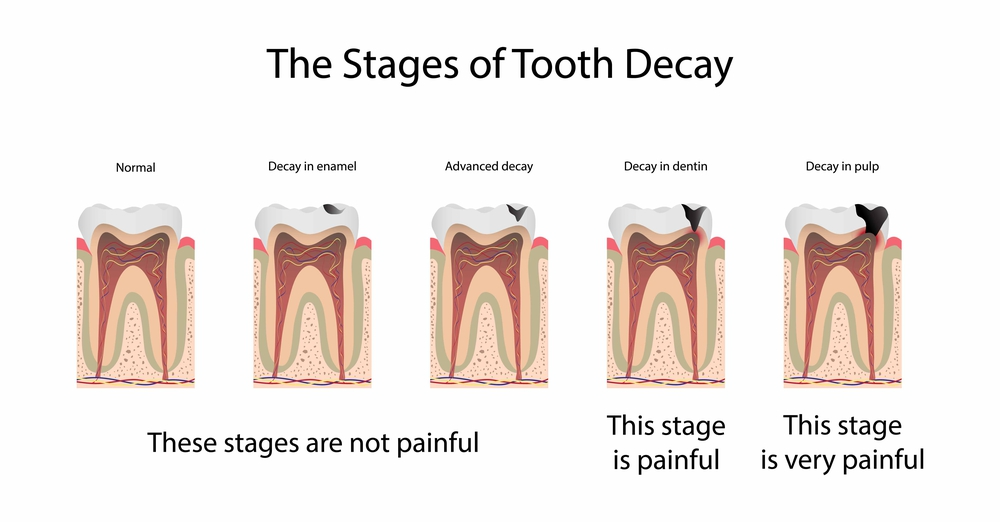By the time you notice a toothache, tooth decay has passed the initial stages and is affecting the sensitive dentin beneath the tooth enamel. While a toothache can have many causes, cavities are a common problem. In fact, only 1% of humans go through life without a single cavity. Chances are, if you have a toothache, the cause may be tooth decay.
At Wren Street Dental in Mission, BC, Dr. Amol Shergill and our team of dental experts identify and treat cavities to alleviate pain and restore oral health. If you experience oral pain, call us at 604-820-8702 to schedule an appointment. We will help you get out of pain quickly, so you can live life to the fullest!
In today’s blog, you’ll learn:
- How tooth decay begins
- Stages of tooth decay
- Cavity treatments
- Cavity prevention
How Tooth Decay Begins
First and foremost, the terms cavities, tooth decay, and dental caries all describe the same ailment. Tooth enamel is extremely strong; it is the strongest substance the human body creates and the second strongest material on the planet, next only to diamonds. However, when you consume starches, including sugars, the bacteria in your mouth feast on the starches. They emit an acid that softens tooth enamel by depleting its calcium and phosphorus.
In its vulnerable state, tooth enamel is subjected to bacterial invasion. Bad bacteria in your mouth eat away tooth enamel, leaving a brown or black cavity in its wake. Enamel re-hardens as saliva remineralizes teeth, but cavities remain and will definitely grow if not treated.
Stages of Tooth Decay
When bacteria eat tooth enamel, you won’t notice pain. A toothache develops when tooth decay extends into the sensitive dentin beneath the enamel. Once this happens, the next stage can become very painful. Bacteria reach the pulp within a tooth’s core and can kill nerves and blood vessels inside the tooth. This causes the tooth to die.

Cavity Treatments
We hope to find tooth decay in its earliest stages, before you experience pain. Not only will you be more comfortable, but treating a mild to moderate cavity may be accomplished by placing a dental filling. This is an affordable and effective treatment, completed in one visit to our Mission, BC dentist’s office.
Once decay progresses into the dentin or spreads over the surface of a tooth, a crown may be recommended. Dental crowns cover the entire part of a tooth that we see above the gumline. You may have heard a crown referred to as a cap, because it literally caps a tooth.
When tooth decay reaches the dental pulp within a tooth’s core, the tooth will need root canal therapy (RCT). Past this stage, the tooth will die and require extraction and replacement to restore oral health and function.
Cavity Prevention
You can take measures to prevent cavities. At home, practice a thorough oral care routine daily. This should involve:
- Using a soft-bristled toothbrush
- Using fluoride toothpaste
- Brushing for two minutes, twice a day
- Flossing before bedtime brushing
- Removing plaque from your tongue with a scraper
- Using antibacterial mouthwash
- Drinking plenty of water throughout the day
- Rinsing your mouth with water after eating and drinking
- Reducing starch (and sugar) intake
- Eating crunchy vegetables and fruits
Add to this a professional dental checkup and cleaning every six months. These preventive appointments allow us to identify tooth decay in the earliest stage, demineralization. We can also administer fluoride treatment and, for kids, dental sealants to deter tooth decay.
A Sure Toothache Remedy
If you’ve not visited a dentist in the past six months or if you develop a toothache, call Wren Street Dental in Mission, BC at 604-820-8702. We’ll reserve a convenient appointment time for you to meet with Dr. Shergill for a comprehensive oral exam. He will find the cause of your pain and recommend effective, long-lasting treatment.



